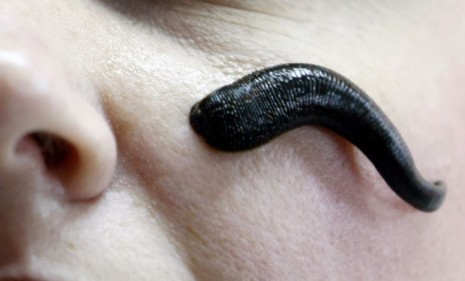Are leeches the new plastic surgeons?
Following an ancient medical tradition, surgeons have used bloodsucking leeches to help reattach a woman's face

A free daily email with the biggest news stories of the day – and the best features from TheWeek.com
You are now subscribed
Your newsletter sign-up was successful
Imagine having your face ripped off in a vicious attack — by your own dog. Now imagine having doctors treat your wound by covering your face with bloodsucking leeches. That's what happened to a woman in Sweden, and the procedure helped doctors reattach a patch of skin from her upper lip to her eye. Here, a guide to this life-changing operation:
What exactly happened?
After the woman was injured, fast-acting relatives placed her detached skin on ice and rushed her to Skane University Hospital in Malmo, Sweden. In the middle of the night, doctors immediately got to work trying to save her detached upper lip, nose, and cheek. "The most important thing was to get blood into the torn off body part, which we managed to do within an hour of the start of the operation," says Dr. Stina Klasson, as quoted in The Local. That's where the leeches came in.
The Week
Escape your echo chamber. Get the facts behind the news, plus analysis from multiple perspectives.

Sign up for The Week's Free Newsletters
From our morning news briefing to a weekly Good News Newsletter, get the best of The Week delivered directly to your inbox.
From our morning news briefing to a weekly Good News Newsletter, get the best of The Week delivered directly to your inbox.
Why leeches?
It may seem medieval, but "leech therapy exploits the bloodsucking properties of these slimy creatures in order to reestablish blood flow between detached body parts," says Ryan Jaslow on CBSNews.com. Known as hirudotherapy, the practice is used throughout the world — the FDA approved the sale of medical leeches in 2004. Leech saliva contains a mild anesthetic and an antibiotic, making leeches ideal for surgical use. The 14-hour operation in Sweden used up the hospital's entire supply of leeches, so more had to be flown in from the U.K. In all, 358 leeches were used.
Did the operation work?
Yes. "The results appear to be good. Her whole nose has survived. The patient can breathe, eat, and talk," says Dr. Jens Larsson, as quoted in the Daily Mail. Though the surgeons are calling the operation a success, they also say the woman will probably need further reconstructive surgery in the future.
A free daily email with the biggest news stories of the day – and the best features from TheWeek.com
Sources: CBSNews, Daily Mail, The Local
-
 The ‘ravenous’ demand for Cornish minerals
The ‘ravenous’ demand for Cornish mineralsUnder the Radar Growing need for critical minerals to power tech has intensified ‘appetite’ for lithium, which could be a ‘huge boon’ for local economy
-
 Why are election experts taking Trump’s midterm threats seriously?
Why are election experts taking Trump’s midterm threats seriously?IN THE SPOTLIGHT As the president muses about polling place deployments and a centralized electoral system aimed at one-party control, lawmakers are taking this administration at its word
-
 ‘Restaurateurs have become millionaires’
‘Restaurateurs have become millionaires’Instant Opinion Opinion, comment and editorials of the day